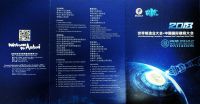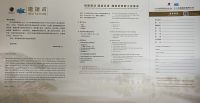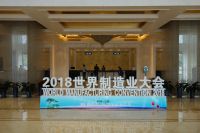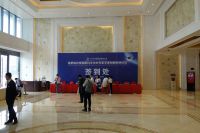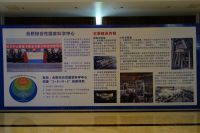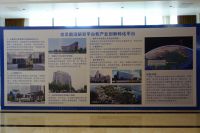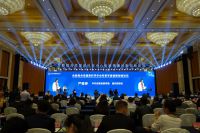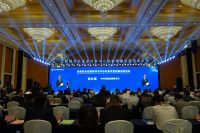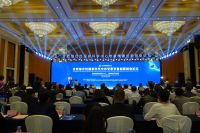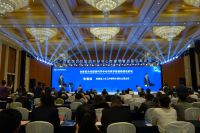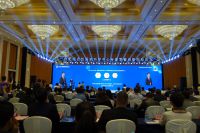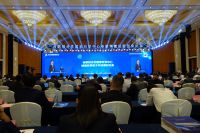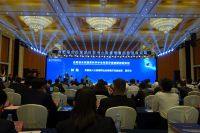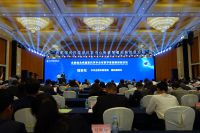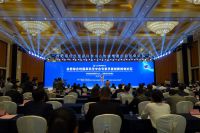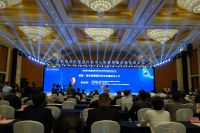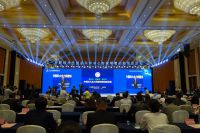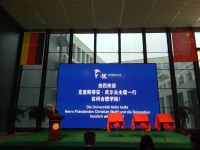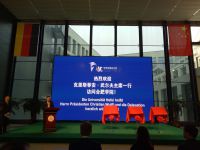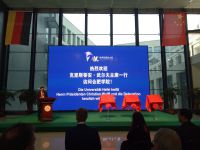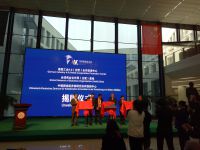Today, I had the honor to attend the World Manufacturing Convention 2018 [世界制造业大会], taking place from April 24 to 26, 2018, here in Hefei [合肥], Anhui [安徽], China. The event follows the motto Shaping the Future of Manufacturing and is under the co-chairmanship of Christian Wulff, the former President of Germany, Jean-Pierre Raffarin, the former Prime Minister of the French Republic, Ban Ki-moon, the former Secretary-General of the United Nations, who all also give keynote speeches, as well as the Party Secretary and the Governor of the Province Anhui, amongst others. The convention is organized by by the Anhui Provincial Government, the United Nations Industrial Development Organization (UNIDO), the Global Alliance of SMEs (GASME), and the Chinese People's Association for Friendship with Foreign Countries [中国人民对外友好协会]. The conference is attented by representatives from 70 countries and from several Fortune 500 companies, such as Volkswagen, HP, General Motors and Microsoft. The goal is to discuss topics revolving around smart manufacturing, such as artificial intelligence, operations research, the Internet of Things (IOT), and robotics, but also smart homes and consumer goods.
At this huge convention, I mainly attended the Expert and Scholar Innovation and Entrepreneurship Forum of the Hefei Comprehensive National Science Center [合肥综合性国家科学中心专家学者创新创业论坛]. The focus of this meeting was the discussion of the innovation platform construction and the policy of talent introduction in the form of policy releases, keynote speeches, and expert interaction. Hefei has become one of the three science hubs in China, only outperformed by Shanghai and Beijing, and now ranks amongst the top-ten most prosperous provincial capitals as well as amongst the most popular cities for foreign experts to work in in China. Clearly, the University of Science and Technology of China (USTC) [中国科学技术大学], where I have worked from 2009 to 2016, has contributed the most to the scientific side of these achievements. It is also the driving force behind the Hefei Comprehensive National Science Center and was represented by its president at the meeting. However, another very significant contributor to this high internationality of Hefei should not be overlooked: our Hefei University [合肥学院] fuels the exchange of experts between Germany and China for more than 30 years. I belive that no other institution in our city has both invited more experts from Europe to China and sent more students and teachers there for further education. The local universities and the governments of the city and province have realized that hiring, attracting, and retaining top-level talents is one of the most important tasks that our city needs to accomplish if it wants to keep improving. In this session, the government representatives therefore introduced several very impressive policies to support and attract both scientific researchers and high-tech start-ups. We also saw some very interesting presentations of the achievements and improvements of the city, province, and USTC which will further attract more top-level researchers to join our city and make it even stronger. This was a very interesting forum for the exchange of thoughts and the reported progress was very impressive.
One big topic at the convention is smart manufacturing, which is embodied by concepts such as Industry 4.0 and the more general paradigm of Made in China 2025 [中国制造2025]. This is interesting for us, as our institute works on optimization and automatic planning as well as logistics, which are essential building blocks for smart manufacturing. Indeed, most of the sessions of the convention were related to (if not focused on this topic in one way or another). It even played a role in the above-mentioned Expert and Scholar Innovation and Entrepreneurship Forum. China, together with Germany, is one of the leading countries in this development, it is no wonder that this international event takes place here.
Another event within the framework of the World Manufacturing Convention 2018 was the opening of three new Chinese-German Collaboration Centers, the German Industry 4.0 (Hefei) Cooperation Promotion Center, the Global Network of Business Organization (Hefei) Base, and the Chinese-German Center for Collaborative Innovation in Research on Solid Waste, at Hefei University. This opening was conducted by a delegation led by Christian Wulff, the former President of Germany.
After the Artificial Intelligence International Youth Summit at the end of last year, the convention was another very nice event in Hefei and attending it was a great experience. Hefei has become not just a major city in China, but an important, top-level hub for science and resarch in the country. Successfully hosting such a high-profile international event is another great accomplishment by the province and city.




